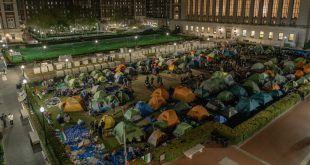An investigation by the South African government has concluded that weapons were not loaded onto a Russian vessel under American sanctions that docked near Cape Town last year, contradicting accusations by U.S. officials that South Africa had provided arms for the war in Ukraine, President Cyril Ramaphosa said on Sunday.
“The panel found no evidence that any cargo of weapons was loaded for export on to the ship, Lady R,” Mr. Ramaphosa said in a televised address, after an investigation commissioned by him and led by a retired judge.
Mr. Ramaphosa had said that he would not release the entire report to protect classified information, but that a summary would be made public on Monday.
It remains to be seen whether the findings will soothe the relationship between South Africa and the United States, which has reached its most tense period in years in large part because of the dispute over what happened when the Lady R, a commercial cargo ship, docked at a South African naval base under cover of night last December.
In May, the U.S. ambassador to South Africa, Reuben E. Brigety II, made the highly unusual move of publicly accusing South Africa of loading arms onto the Lady R, saying that he would bet his life on it based on the intelligence he had seen. That caused a serious backlash in South Africa, with Mr. Brigety being summoned to meet with the foreign minister, Naledi Pandor, and, according to South African officials, apologizing for his public statement.
Since then, officials in each country have attempted to patch up the wounds, but threats have lingered that the United States could revoke South Africa’s trade privileges.
During the South African investigation, the panel traveled to a naval base in Simon’s Town, interviewed more than 50 people and reviewed over 100 documents, Mr. Ramaphosa said. The officials who made the claims were also invited to submit evidence, but they either did not appear or said they did not have firsthand information, Mr. Ramaphosa said in his address.
“None of the persons who made these allegations could provide any evidence to support the claims made against our country,” he said.
The accusations, South Africa’s president said, had damaged the country’s economy and its standing in the world, and called into question the country’s position in the war between Russia and Ukraine.
Mr. Ramaphosa coupled his announcement with a statement on the success of the recent meeting of emerging nations held in Johannesburg, where leaders from Brazil, Russia, India and China, alongside South Africa — a group known as BRICS — reiterated a neutral stance in the war, while President Vladimir V. Putin of Russia used his platform to rail against the West.
South African officials have embraced a sentiment — supported by Mr. Putin and China’s top leader, Xi Jinping — of creating a new world order that does not revolve around the West.
South Africa’s decision to maintain warm ties with Russia, despite its invasion of Ukraine, has been a major sore spot for the United States and other Western allies. The close alliance dates to the era when the Soviet Union supported the fight against South Africa’s apartheid regime.
Since the Ukraine invasion, South African officials have said that they were maintaining a neutral stance and wanted a peaceful resolution while refusing to pick sides in a battle between superpowers.
But the United States and other Western nations have accused South Africa of failing to stick to its neutrality. In February, South Africa held naval drills with Russia and China. In May, it allowed a Russian cargo plane targeted by U.S. sanctions to land at an air force base near the capital of Pretoria. And last month, Mr. Ramaphosa warmly embraced Mr. Putin at a Russia-Africa summit in St. Petersburg, Russia. Mr. Ramaphosa has been one of his continent’s most vocal supporters of Mr. Putin.
Beyond the allegations from the U.S. ambassador, much of the suspicion around the Lady R came from the unusual circumstances surrounding the ship’s arrival along the South African coastline last year.
Windward, a company that uses artificial intelligence to analyze maritime activity, analyzed the ship’s movements for The New York Times, and found that over the past decade, the Lady R almost exclusively traveled the same route between Novorossiysk, Russia, and China repeatedly.
But last October, the Lady R set sail on a route it had never traveled before that took it all the way around Africa, according to Dror Salzman, an analyst at Windward, which provides research to the United Nations. That new route was unusual, Mr. Salzman said, because ships typically change their routes so drastically only when they have new owners or are sailing under new flags, neither of which was the case with the Russian vessel, which is owned by Transmorflot.
After making several stops, including at ports in Togo and Cameroon, the ship sat early last December just outside of South African territorial waters, near Cape Agulhas on the continent’s southern tip. The transponder showing its location then went dark, according to Mr. Salzman, and did not come back on until four days later, near the same spot.
During those days while the transponder was off, residents in Simon’s Town, roughly 25 miles south of Cape Town and home to a South African naval base, reported seeing the ship docked there. Retired naval officers living in Simon’s Town and a residents said that trucks taking cargo to the ship stopped at a sports field hidden by trees rather than the armory, as is normally the case. The retired officers said they also found it suspicious that the ship was offloaded at night.
The Lady R left Simon’s Town on Dec. 9. It sailed up the east coast of Africa and, before docking in Mozambique, its transponder again went off for a little more than a day, Mr. Salzman said.
Thandi Modise, South Africa’s defense minister, has said the Lady R was delivering an order of equipment for South Africa’s defense forces that was placed in 2018-19 but that could not be delivered because of the pandemic. No weapons were loaded onto the ship, she said.
John Eligon reported from Johannesburg, and Lynsey Chutel from Simon’s Town, South Africa.
 Top Naija News: Nigerian News, Breaking News Nigeria and World News Top Naija News is a daily news publication in Nigeria, delivering the latest breaking news in Nigeria and around the world.
Top Naija News: Nigerian News, Breaking News Nigeria and World News Top Naija News is a daily news publication in Nigeria, delivering the latest breaking news in Nigeria and around the world.



